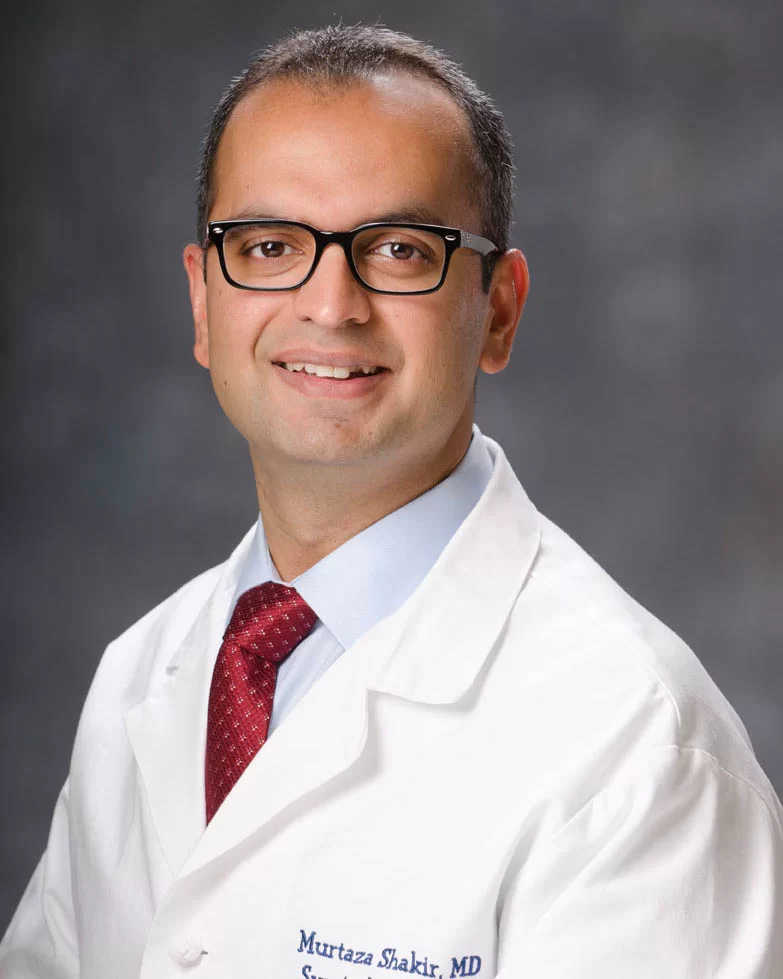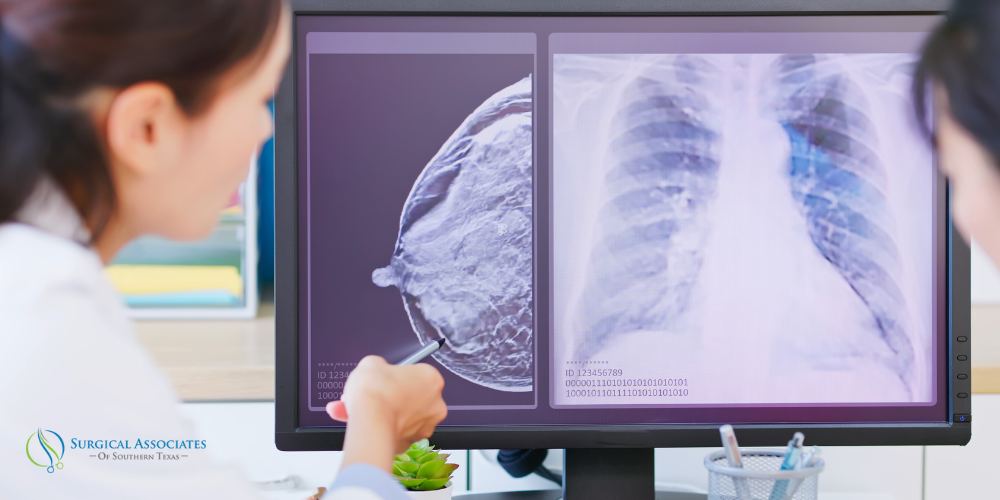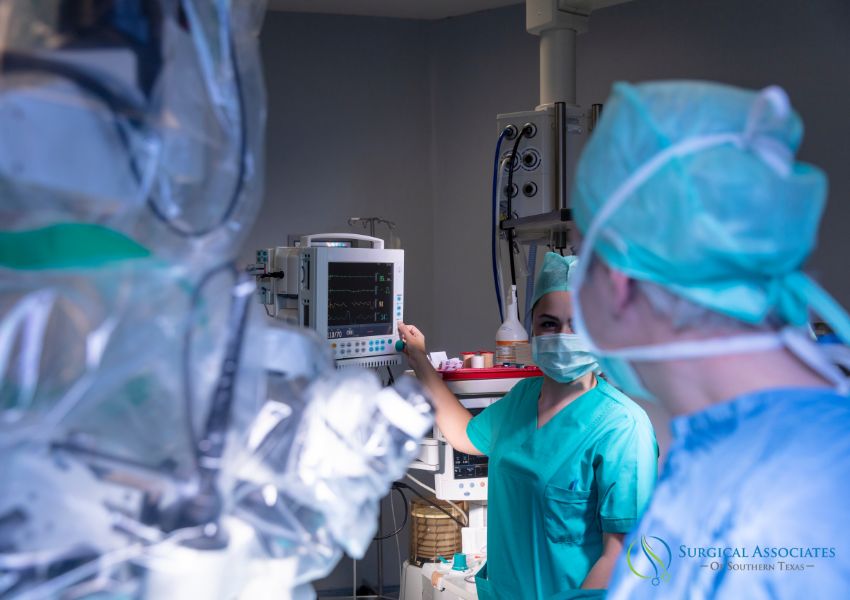Breast Cancer
Breast Cancer Surgeon in Greater Houston
Breast Cancer Specialists at Surgical Associates of Southern Texas.
Dr. Murtaza Shakir, specialised surgeon for breast cancer, Board-certified General Surgeon and Surgical Oncologist working in Katy and Sugar Land.
What is breast cancer?
Often, symptoms of breast cancer or other diseases are detected late when it comes to younger women as it is believed that they are less at risk for developing them. This is because 75% of cases of breast cancer reportedly occur in women over 50. It is important to spread breast cancer awareness to ensure the women around you are safe and healthy. Visit us today for consultation with Dr. Murtaza. Appointment can be made by online or making call at 713-955-9191. Clinics are located at 410 W Grand Pkwy S Suite 4D, Katy, TX 77494 and 17510 W Grand Pkwy Suite No 320, Sugar Land, TX 77479
Awareness is Key
Understanding the symptoms of breast cancer and the role of diagnostic tools like mammograms, MRIs, and biopsies is the first step in the fight against this disease. Regular self-breast examinations, combined with routine screenings, are vital for early detection. Remember, the earlier the detection, the higher the chances of successful treatment and recovery.
What are the types of breast cancer?
- Non-invasive Breast Cancer (Carcinoma In Situ)
- Found in the breast ducts
- Stays within the duct
- Detected with a mammogram
- Invasive Breast Cancer
- Forms in the breast ducts
- Tumor spreads beyond ducts
- Surrounding tissue is affected
What are the symptoms of breast cancer?

Dr. Murtaza Shakir has been ranked as one of the top doctors of General surgery in Houston, as per Houstonia
Houstonia
Our Surgeon
Board-certified General Surgeon and Surgical Oncologist
Dr. Shakir is a board-certified General Surgeon and Surgical Oncologist working in Katy and SUGAR LAND. After graduating from Medical School at Aga Khan University in Karachi, Pakistan, he ventured to complete his residency in General Surgery at the Riverside Methodist Hospital in Columbus, Ohio. He also specializes in providing the most cutting edge and personalized treatment for patients with Breast Cancer.
Specialized Surgeron
As a general surgeon he provides expert treatment of common general surgical problems like Gallbladder Surgery and Hernia Repair and complex abdominal wall reconstruction.
General Surgeon & Surgical Oncologist
Being the only Board Certified Surgical Oncologist outside of the Texas Medical Center, Dr. Shakir specializes in treatment of various Malignancies ranging from Colon, Rectal, Liver and Pancreatic cancer
Need Consultation!
713-955-9191

Breast Cancer Symptoms and Tools for Detection
Recognizing the Symptoms
Breast cancer symptoms vary widely, and some individuals may not even experience any signs during the initial stages of the disease. However, being aware of changes in the breast and nearby areas is crucial for early detection. Here are the most common symptoms to look out for:
- A lump or thickening in the breast or underarm area.
- Change in the size or shape of the breast.
- Pain in any area of the breast that does not go away.
- Dimpling or puckering of the skin of the breast, similar to the skin of an orange.
- Nipple retraction or the nipple turning inward.
- Redness, scaliness, or thickening of the nipple or breast skin.
- Nipple discharge other than breast milk.
If you observe any of these signs, it’s essential to consult with a healthcare provider promptly.
Detecting Breast Cancer: Mammograms
A mammogram is a specialized X-ray of the breast and is one of the most effective tools for early detection of breast cancer. It can identify lumps or masses that are too small to be felt through physical examination. Regular mammograms are recommended for women aged 40 and above, as the risk of breast cancer increases with age. However, depending on your risk factors, your doctor might recommend starting mammograms earlier or more frequently.
Using MRI for Breast Cancer Detection
Magnetic Resonance Imaging (MRI) uses magnetic fields and radio waves to create detailed images of the body’s internal structures. A breast MRI provides a more detailed picture than a mammogram and is often used for women with a high risk of breast cancer, such as those with a strong family history or specific genetic mutations. An MRI can help identify smaller lesions or evaluate the extent of disease in a diagnosed breast cancer patient.
Confirming the Diagnosis: Biopsy
While mammograms and MRIs are excellent tools for identifying areas of concern, a biopsy is the only definitive way to confirm a breast cancer diagnosis. During a biopsy, a small sample of tissue from the suspicious area is removed, either surgically or using a special needle, and then examined under a microscope for signs of cancer. The biopsy provides essential information about the type of cancer, its aggressiveness (grade), and whether it’s sensitive to hormones or HER2 protein, all of which help guide treatment decisions.
Breast Cancer Stages
Stage 0: The Starting Point
Considered the earliest form of breast cancer, Stage 0, or carcinoma in situ, is where the journey begins. At this stage, the abnormal cells are non-invasive and remain confined to the ducts or lobules in the breast. They haven’t started their invasive journey into the surrounding breast tissue yet. The diagnosis at this stage often results in a high survival rate with various treatment options, including surgery or radiation.
Stage 1: The Early Invasion
This stage is divided into two subcategories – Stage 1A and 1B, marking the early phase of invasive breast cancer. At this stage, the tumor measures up to 2 centimeters, and small groups of cancer cells may have spread to nearby lymph nodes. The early detection of Stage 1 gives way to multiple effective treatment plans and a very high five-year survival rate.
Stage 2: The Expansion
Stage 2 of breast cancer is further divided into Stage 2A and 2B, a sign of the cancer’s growth and possible spread to some nearby lymph nodes. Though the news may feel daunting, remember that many successful treatment options are available at this stage. The approach may encompass a combination of surgery, radiation, and systemic medical therapies.
Stage 3: The Advanced Invasion
This stage represents a more advanced form of breast cancer but is not classified as metastatic. Divided into stages 3A, 3B, and 3C, it is characterized by larger tumor size and the spread to multiple nearby lymph nodes or the chest wall. Although considered severe, advancements in treatment approaches continue to improve survival rates for Stage 3 breast cancer patients.
Stage 4: The Metastasis
Often referred to as metastatic or secondary breast cancer, Stage 4 signifies that the cancer has traveled beyond the breast and underarm lymph nodes to other parts of the body, such as the liver, lungs, or bones. The focus of treatment in this stage shifts from curative intent to managing symptoms and enhancing the quality of life.
Testimonials
How Patients Value Our Care
How do doctors at Surgical Associates diagnose breast cancer?
Breast cancer is worrying, but over 2 million women are proud survivors of breast cancer. When you consult a GP after a self-exam, they may refer you to a breast cancer clinic for further testing (mammograms and biopsies) to determine the presence and nature of the tumor. Surgical Associates of Southern Texas is one of the leading oncology clinics in Texas for breast cancer treatment options. healthy.
Our Blogs: General Information

General Surgeons within the USA for surgeries with a wide range of medical conditions
General surgeons are highly skilled medical professional who has a specialization in surgeries that cover many medical issues. Starting from the removal of gallbladders and tumors to fixing...
Making the most of surgical outputs
Having one-on-one interaction with our top surgeon helps in understanding the complete surgical procedure. Whether it is for general surgery or surgical oncology, we try to ensure best surgical outputs for local and overseas patients.
Accepting Patients From Greater Houston, Katy, Sugar Land, Richmond, Fulshear Areas.
Patients visiting from the greater Houston and other areas of Texas are requested to call us for a confirming appointment. Overseas patients request us to contact us in advance for a detailed consultation.
Get Directions…….
